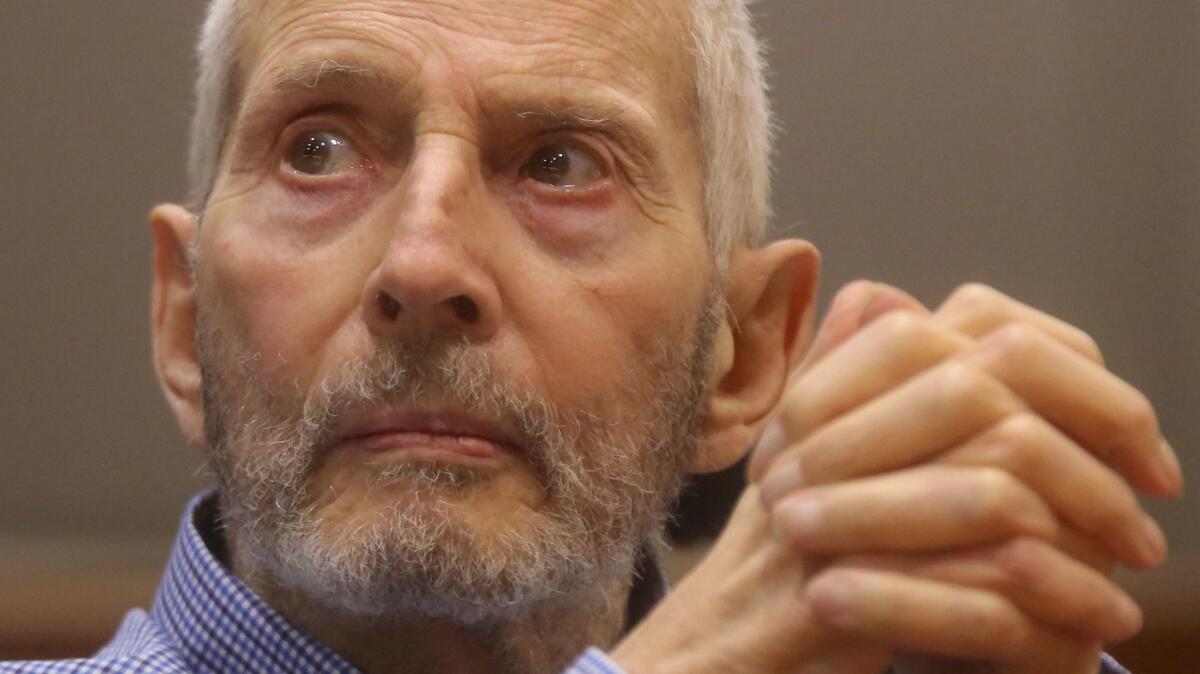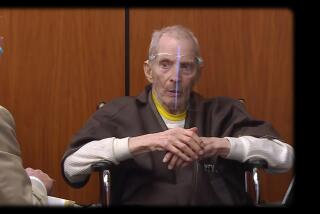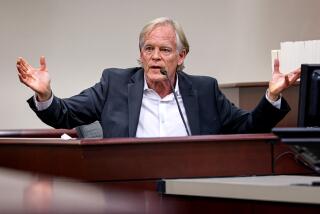Witness says Robert Durst confessed to killing woman: ‘It was her or me’

New York real estate scion Robert Durst admitted during a dinner conversation in 2014 to killing writer Susan Berman, according to the testimony of a man who says he was a close friend of both the victim and her alleged killer.
Nathan “Nick” Chavin, 72, said in court Thursday that Durst made a remark he took as a confession to the execution-style slaying of Berman after the pair had dinner in New York City three years ago.
“I had to. It was her or me; I had no choice,” Durst said at the time, according to Chavin.
Chavin testified at a special hearing in the case against Durst, who is charged with shooting Berman in the back of the head 17 years ago inside her Benedict Canyon home.
Prosecutors allege that Durst killed Berman, his confidant, because he feared she was going to talk to detectives about the 1982 disappearance of his wife, Kathleen Durst.
Earlier on Thursday, Chavin testified that Berman had told him that Durst confessed to her that he had killed Kathleen.
“Susan said to me, ‘Bob killed Kathie,’” Chavin testified, adding that Berman told him the confession came from Durst himself.
Chavin, a longtime friend of both Durst and Berman, was hustled into court earlier in the week as a “secret witness,” flanked by bodyguards. Durst’s trial in Berman’s slaying is not likely to take place until at least 2018, but prosecutors had asked that Chavin testify early out of fear he might be killed before trial.
Chavin’s testimony may prove crucial, as prosecutors contend Durst made the decision to kill Berman after learning she planned to speak with investigators in New York about his wife’s disappearance.
Asked why he hadn’t told police of the admission earlier, Chavin said Thursday that Berman had insisted they protect Durst.
“Kathie’s dead, we can’t do anything about it,” Chavin testified Berman told him. “We have to protect Bob.”
Recalling the 2014 conversation, Chavin said Durst had invited him to dinner to discuss Kathleen’s disappearance and Berman’s death, but the topic didn’t come up until they exited the restaurant.
“You wanted to talk about Susan?” Chavin asked as they stepped onto a sidewalk, prompting Durst to give what he considered to be a confession.
As Durst walked away, Chavin said, he then asked about Kathleen. Durst continued silently, Chavin recalled.
“This is not easy,” Chavin said Thursday, his eyes welling up with tears on the stand.
Asked how he felt about testifying, Chavin said he felt “like it’s something I have to do.”
“As you sit here, do you still feel a bond — and a warmth — toward Bob Durst?” a prosecutor asked.
“It sounds ridiculous, but yes,” he said. “This is a best friend who admitted to killing my other best friend.”
Chavin said he first told police of Durst’s supposed confession to Berman in 2001, when he was interviewed by New York State Police Investigator Joseph Becerra. But at that time, Chavin said, he didn’t believe Durst had played a role in any of the slayings, believing Kathleen had been killed by a drug dealer.
His view changed seven months after the interview, when Durst was arrested in connection with a grisly slaying in Galveston, Texas. Durst’s admission that he had dismembered the corpse of neighbor Morris Black struck Chavin as disturbing. Until that point, Chavin testified, he had never believed Durst was “capable of hands-on violence.”
“It was like taking the gloves off,” Chavin said.
Durst was acquitted of murder in the Galveston case after arguing that Black had been killed as the two men struggled over a gun that went off.
Edward J. Imwinkelried, a professor emeritus at UC Davis who co-authored the annotated California Evidence Code, said Durst’s attorneys would have a difficult time trying to prevent jurors from hearing Chavin’s testimony about Durst’s confession to killing Berman.
“Since [Durst] evidently makes this statement to a private party, who I assume at that point isn’t acting as an agent of the government, you don’t have any due process problems,” Imwinkelried said.
It is less likely that a jury would hear Chavin’s testimony about Durst’s supposed confession to killing his first wife, Imwinkelried said. Because Chavin said that he didn’t hear the confession himself but heard about it from Berman, a judge would consider it “double hearsay” and might not allow the testimony at a trial, the professor said.
“Judges are understandably, and quite justifiably, concerned about only admitting reliable testimony. When you’ve got double hearsay, you’ve got double the problem,” Imwinkelried said.
During his testimony earlier in the week, Chavin — a New York advertising executive — said that Kathleen Durst was afraid of her husband, even fearing he might physically harm her. Despite that fear, he testified, she never said anything to indicate her husband had been physically violent with her.
A prosecutor also asked Chavin on Wednesday whether he believed Durst was involved in his first wife’s disappearance at the time that she vanished.
“No,” Chavin, 72, said emphatically.
Chavin told the court that Durst was best man at his wedding, and that the two had known each other for nearly three decades. Durst drastically changed the trajectory of Chavin’s career by asking him to do advertising for some of the Durst Organization’s holdings, he said. The family-run company is a dominant player in the prime Manhattan real estate market. Durst’s father, Seymour, became one of Chavin’s mentors.
Chavin’s relationship with Robert Durst crumbled in the early 1990s, however, when Chavin took a meeting with Durst’s brother Douglas, whom the defendant despises, the witness said.
Douglas Durst had asked Chavin to visit the family business, where Robert Durst was also working at the time. Aware that his friend was inside the company’s New York headquarters, Robert Durst asked if Chavin wanted to come down to his office, but Chavin replied that he couldn’t because he had a meeting with Douglas, according to Chavin’s testimony.
Chavin said he immediately regretted the comment. That was the last time the two had contact for several years, until Durst’s father died in 1995.
Chavin made several attempts to mend the fractured friendship, even writing Durst a long letter telling him how sorry he was about his father’s death. Durst didn’t write back, but Chavin eventually received a phone call from Durst’s second wife, Debrah Lee Charatan, relaying a message from the real estate tycoon: “It’s maudlin.”
The message made him feel awful, Chavin testified, saying he had poured his heart out in the letter.
On Wednesday, Chavin described Berman as an exceedingly generous person — the type of friend, he said, who gave him a navy blazer worth about $400 after he moved to New York. She told him it was a must-have in work circles, knowing he was clueless about such things, he said.
Chavin grew up in El Paso, worked for a while as a musician and received a master’s degree in creative writing from San Francisco State University. He said he met Berman in the Bay Area in the late 1970s, soon before relocating to New York and getting work as a copywriter at an advertising agency. Before long, the witness said, Berman introduced him to Durst, and the trio became close friends.
More to Read
Sign up for Essential California
The most important California stories and recommendations in your inbox every morning.
You may occasionally receive promotional content from the Los Angeles Times.












